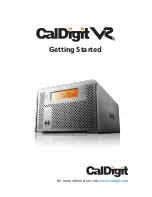
HYPERMAX OS support for open systems
HYPERMAX OS supports FBA device emulations for open systems and D910 for IBM i.
Any logical device manager software installed on a host can be used with the storage
devices.
HYPERMAX OS increases scalability limits from previous generations of arrays,
including:
l
Maximum device size is 64TB
l
Maximum host addressable devices is 64,000/array
l
Maximum storage groups, port groups, and masking views is 64,000/array
l
Maximum devices addressable through each port is 4,000
HYPERMAX OS does not support meta devices, thus it is much more difficult to
reach this limit.
For more information on provisioning storage in an open systems environment, refer to
Open Systems-specific provisioning
For the most recent information, consult the EMC Support Matrix in the E-Lab
Interoperability Navigator at
Open systems features
58
Product Guide
VMAX 100K, VMAX 200K, VMAX 400K with HYPERMAX OS
Summary of Contents for VMAX 100K
Page 1: ...EMC VMAX3 Family Product Guide VMAX 100K VMAX 200K VMAX 400K with HYPERMAX OS REVISION 6 5 ...
Page 20: ...Preface 20 Product Guide VMAX 100K VMAX 200K VMAX 400K with HYPERMAX OS ...
Page 46: ...VMAX3 with HYPERMAX OS 46 Product Guide VMAX 100K VMAX 200K VMAX 400K with HYPERMAX OS ...
Page 72: ...Open systems features 72 Product Guide VMAX 100K VMAX 200K VMAX 400K with HYPERMAX OS ...
Page 82: ...Provisioning 82 Product Guide VMAX 100K VMAX 200K VMAX 400K with HYPERMAX OS ...
Page 158: ...Remote replication solutions 158 Product Guide VMAX 100K VMAX 200K VMAX 400K with HYPERMAX OS ...
Page 186: ...Mainframe Error Reporting 186 Product Guide VMAX 100K VMAX 200K VMAX 400K with HYPERMAX OS ...
Page 200: ...Licensing 200 Product Guide VMAX 100K VMAX 200K VMAX 400K with HYPERMAX OS ...
















































